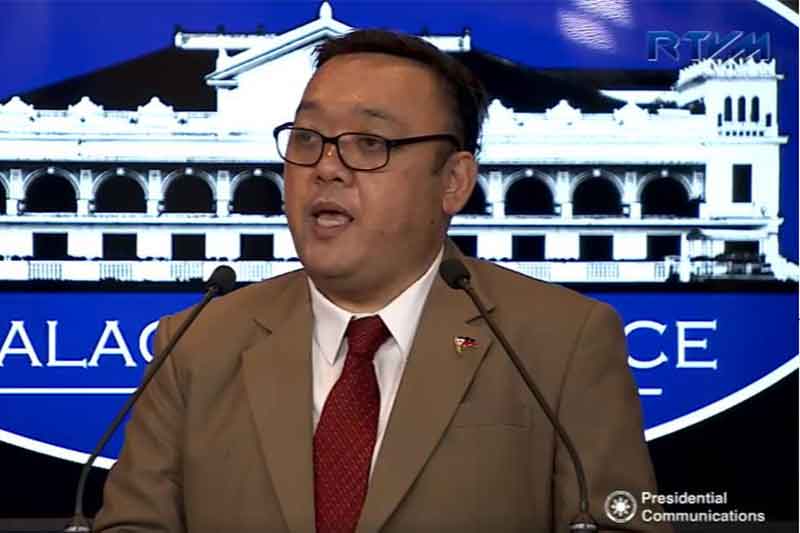Harry Roque to quit if law passed vs fake news

Roque said the anti-fake news bill violates the constitutional provision that prohibits laws that would abridge freedom of expression and of the press. File
MANILA, Philippines — President Duterte’s spokesman yesterday vowed to quit if Congress passes a law against fake news, a measure that he believes would violate the Constitution.
As this developed, social media giant Facebook is ready to work with the Philippine government and other organizations to improve digital literacy in the country and combat the spread of false information using the online platform.
Roque said the anti-fake news bill violates the constitutional provision that prohibits laws that would abridge freedom of expression and of the press.
“I promise that if one such law is enacted by Congress, I will resign from my post and sue before the Supreme Court to challenge its constitutionality,” Roque said in a press briefing in Kalinga.
Sen. Grace Poe, one of the rivals of Duterte during the 2016 presidential race, has filed a bill seeking to prohibit government personnel from peddling “fake news.”
The measure, which was filed in the wake of allegations that some officials are spreading misinformation and propaganda, aims to uphold “accuracy, reliability and truthfulness” expected from the government.
Roque said Poe’s bill “is presumed to be unconstitutional because it contemplates restrictions.”
He believes there is no need to pass the bill because the Duterte administration never tolerated fake news.
“We also don’t see any reason why they should be singling out government. I think the commitment to the truth should be a responsibility imposed on all forms of journalists, not just those writing for the government,” Roque said.
“There is simply no basis for distinguishing between the commitment to write the truth if you’re a government employee and commitment to write the truth if you’re a private journalist,” he added.
Roque claimed that all journalists, whether in government or private media, have published false news.
“Sometimes it is by accident, but all writers, whether it be journalists in government or private media, are equally guilty of publishing false news. There’s no basis for just singling out government officials for criminal liability. In my mind, that’s unconstitutional,” he added.
Facebook ready to help
Clair Deevy, Facebook’s head of community affairs in Asia-Pacific, said they have rolled out various programs in the Philippines to improve digital literacy, especially among Filipino students.
“We’ve got a commitment to people having a great experience on Facebook. We want people to have great connections, great social interaction,” she told The STAR last week.
“The program is consistently evolving with feedback from our partners because year to year, things change, the focus (changes). We want to make sure that we’re addressing the things that are most critical,” she added.
Deevy said they are currently working with the Department of Education (DepEd) and other private groups to develop digital literacy programs for Filipino students.
She joined various activities held in time with the Safer Internet Day last week, including the launch of the first digital discernment workshop with DepEd and Globe Telecom.
The workshop, which will be rolled out in different schools nationwide, contains topics that teach online users how to think critically online and effectively identify credible information from questionable information.
The Facebook executive also joined the culminating activity for students who joined the five-week digital literacy program “Think Before You Share” that was launched last year.
“For Facebook, we want to bring the world closer together and help build communities. The way to do that is to make sure that the experience for people is a great experience,” Deevy said.
“Digital literacy is about giving people the basics of coming online and coming on to Facebook, to understand that the rules that apply on the real world – how you treat each other, how to interact – also apply online. Just because you are now looking at the mobile device doesn’t mean that the things that you learn suddenly goes out the window,” she added.
Fighting fake news
Responding to criticisms about Facebook being used as a platform to spread false information, Deevy said they are rolling out various programs to address the issue.
“This topic is a difficult topic. In terms of Facebook… we don’t want to be deciding what’s true and what’s not, what’s opinion and what’s not. I don’t think that’s the role that the community wants us to play, for Facebook to be taking an editorial line on these things,” she said.
“There’s a few things that we’ve launched, we now have the ability for people to report if they believe something is wrong, then we can review it and it can be downranked in terms of where it appears,” she said.
Deevy also noted the use of technology to get rid of links that contain wrong information and bad advertising content, as well as mechanisms to report violations of community standards.
She also noted an initiative in some countries where they offer people with articles that present a different view on the what they read.
“We want to make sure that people have a great experience online as well,” Deevy said. “Digital literacy is finding the right way to educate people, about what the community standards of Facebook, what is and what is not allowed and really thinking what the impact is of what you do online.”
Related video:
- Latest
- Trending






























